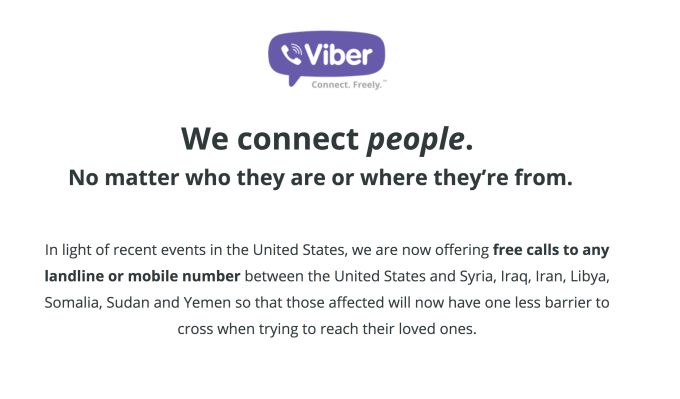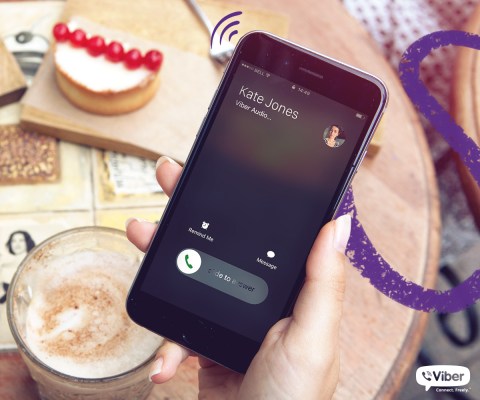Mobile calling app Viber is the latest tech company to offer help to those affected by President Trump’s immigration and travel ban. This morning, the company announced it would indefinitely waive the fees for calls to landlines or mobile numbers between the U.S. and the seven countries impacted by the travel ban, including Syria, Iraq, Iran, Libya, Somalia, Sudan and Yemen.
Similar to other calling apps, direct calls between Viber users are always free, but dialing out to a landline or a mobile phone via the “Viber Out” service would cost money. Viber typically charges a per-minute fee, which could be paid for via a calling plan or by purchasing credit to pay as you go. These rates would vary by the call’s destination.
Viber has fairly quickly rolled out support for free calling in the affected regions, and announced the move via Twitter and a simple informational website, found here.
On the site, the company offers a brief statement on the matter, which doesn’t go so far as to condemn the travel ban directly, but instead offers support to those affected. Under the heading, “We connect people. No matter who they are or where they’re from,” a statement reads:
In light of recent events in the United States, we are now offering free calls to any landline or mobile number between the United States and Syria, Iraq, Iran, Libya, Somalia, Sudan and Yemen so that those affected will now have one less barrier to cross when trying to reach their loved ones.

Hiroshi Mikitani, the CEO of Rakuten, which acquired Viber several years ago, feels very strongly about Trump’s executive order.
Over a series of tweets on Twitter, he came out against the ban, saying how wrong it is to discriminate based on religion and nationality.
“I am very sad to see what is happening now in the U.S. I came to U.S. when I was seven and I really respect big American big heart,” Mikitani tweeted. “But it is wrong as a human being to uniformly discriminate based on religion and nationality. We will make sure we will support our Muslim staff members as a company and personally as well. Rakuten Group Viber will announce tomorrow free international calls from the U.S. to all countries banned.”
“My dad is crying in the heaven. He went to Harvard, Stanford and Yale. He was so proud and I am too. Now I am really crying,” he added.
The ban has already prompted action from a number of tech companies, who are fighting back politically, as well as making efforts to help those affected, both internally within their organizations, and externally. Uber, for example, established a $3 million defense fund to help cover legal, immigration and translation costs for drivers affected by Trump’s ban, while Airbnb offered free housing for refugees and others affected by the Trump administration’s executive order, and not allowed in the U.S.
Other tech companies leaders have joined protests, donated the ACLU, and are offering legal assistance to employees. Google created a $2 million crisis fund and Lyft is donating $1 million to the ACLU over 4 years, after coming out against the executive order.
Viber’s offer is one of many demonstrations of support that directly impacts the immigrants and refugees, but it would not be surprising if others in the industry soon followed.
